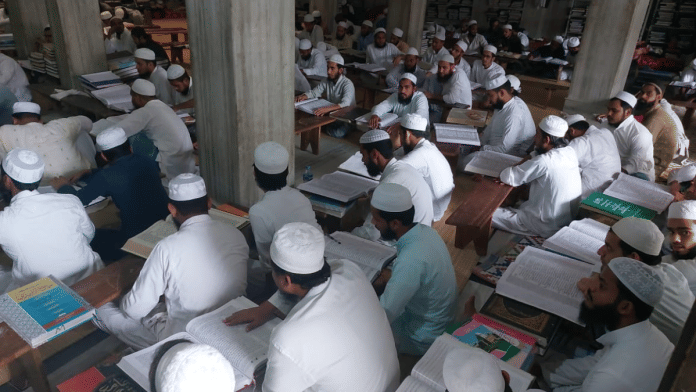New Delhi: Reactions of stakeholders varied from relief to joy as the Supreme Court upheld Tuesday the constitutional validity of the Uttar Pradesh Board of Madarsa Education Act, 2004, providing a major relief to thousands of madrasa teachers and students in the northern state.
A three-judge bench led by Chief Justice of India D.Y. Chandrachud also addressed concerns raised by the Allahabad High Court, which had earlier struck down the Act, claiming it violated the principle of secularism.
There had been uncertainty surrounding these madrasas as their teachers and administrators were not only facing salary delays but also their very existence was at stake. In April, the Yogi Adityanath-led Bharatiya Janata Party (BJP) government had revoked the licences of all 16,000 madrasas across Uttar Pradesh.
Ajay Kumar Srivastava, a teacher at Madrasa Syeda Hussain-ul-uloom in Kushinagar, expressed relief and thanked the Supreme Court for saving the madrasas from “drowning”.
“Teachers and students are very happy today. We can now educate our children in a much better way,” he told ThePrint over the phone.
Srivastava highlighted the ongoing issue of unpaid monthly salaries of Rs 15,000 each, noting that teachers have been working without compensation due to the suspension of funding by both the central and state governments.
The number of madrasa teachers paid under the Scheme for Providing Quality Education in Madrasas (SPQEM) across India has dropped from 50,957 in the financial year 2015-16 to 12,518 in the financial year 2017-18, shows data from a 2018 parliamentary standing committee report. During this same period, this figure fell to 10,724 from 37,824 in Uttar Pradesh. The scheme was rolled out in 2009 when government-appointed teachers were hired in madrasas.
Mehtab Alam, the principal of Madrasa Iqra Public School in Pilkhuwa, explained that no reasons were given after the salaries were stopped, forcing many teachers to do menial jobs. In Hapur, he said that currently there are at least 103 madrasas with at least 300 teachers who didn’t quit their jobs and continued working without salaries.
“We were already doing good work, and I believe the Supreme Court recognised that. This is a great decision for all madrasa board-affiliated schools. We hope to improve further now,” he told ThePrint, reflecting on the mental toll the uncertainty had taken on teachers and students alike.
Madrasa Teachers Union president Azeem Ullah Fareedi called the court ruling a victory for madrasa students and teachers. He stressed that madrasa education provides both Islamic and modern education, and the government’s cessation of funding had politicised the issue.
“Today’s decision is good news for thousands of students in madrasas. The confidence of teachers is restored, and we believe that more students will now rejoin madrasa education,” he told ThePrint.
Iftikhar Ahmed, former chairman of the Uttar Pradesh Board of Madarsa Education, Lucknow, said that the decision is a significant rebuttal to accusations that madrasas were engaged in fraudulent activities. “This is a tight slap on the faces of those who have been accusing madrasas of wrongdoing,” he told ThePrint, expressing hope that the decision would help mend the damage done to the reputation of madrasas.
Welcoming the SC’s decision, Congress leader Rashid Alvi said that the Indian Constitution allows the minorities to build their madrasa and university-like institutions and run them as per their will. “Despite that, if some court or the government gives such a verdict that is against the constitution, that is unfortunate,” he told a news agency.
Meanwhile, BJP leader Mohsin Raza said that the government works as per the verdict of the court. “I want to say one thing: if there is someone who has modernised madrasas, it’s Yogi Adityanath… PM Modi has clearly said that on one hand, it’s the Quran and on the other hand, it should be the computer,” he told the same news agency.
(Edited by Tony Rai)
Also Read: UP’s modern madrasas have run out of govt money. A young girl’s doctor dream is at stake






